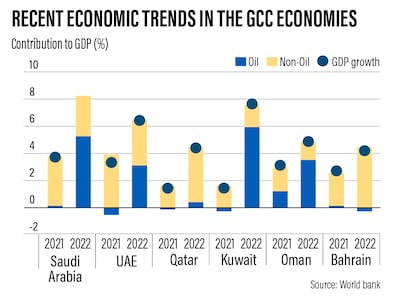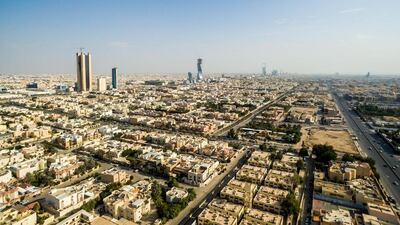Economies in the GCC are set to maintain growth momentum this year, although at a slower pace, as a robust expansion in non-oil economies offsets lower oil income for the six-member bloc.
The region is forecast to grow by 2.5 per cent in 2023, following a 7.3 per cent expansion last year, before picking up to 3.2 per cent in 2024, the World Bank said in its Gulf Economic Update report released on Wednesday.
“The weaker performance is driven primarily by lower hydrocarbon gross domestic product, which is expected to contract by 1.3 per cent in 2023 after the Opec+ April 2023 production cut announcement and the global economic slowdown,” the Washington-based lender said.
“However, robust growth in the non-oil sectors, which is anticipated to reach 4.6 per cent in 2023, will dampen the shortfall in hydrocarbon activities, driven primarily by private consumption, fixed investments and looser fiscal policy in response to 2023’s relatively high oil revenues.”
In a surprise move last month, Opec+ members – including Saudi Arabia, the UAE, Iraq, Kuwait, Oman and Algeria – announced voluntary oil production cuts amounting to 1.16 million barrels per day from May until the end of the year as a precautionary measure to support oil market stability.
Saudi Arabia, the world’s biggest oil exporter and Opec's largest producer, plans to cut its output by 500,000 bpd from May until the end of the year, according to the kingdom's Ministry of Energy.
The UAE will cut its output by 144,000 bpd during the same period, UAE Minister of Energy and Infrastructure Suhail Al Mazrouei said at the time.
In April, the International Monetary Fund lowered its global economic growth estimate for this year by 0.1 percentage points to 2.8 per cent, from what it previously projected in January amid continued geopolitical tensions, tightening of monetary policy and high inflation.
The global economy is projected to grow 3 per cent in 2024, a 0.1 percentage point decline from the previous estimate, the IMF added.
According to the World Bank report, this year’s more modest growth projected for GCC economies, however, is buoyed by the structural reforms undertaken in the past few years.
“Improvement to the business climate and competitiveness, and the overall improvements in female labour force participation in the GCC countries, especially in Saudi Arabia, have all paid off, though further diversification efforts are still needed and is under way,” the lender said.
Saudi Arabia, the Arab world's largest economy, is in the middle of a major economic diversification drive under its Vision 2030 agenda, amid a push to reduce its reliance on oil and tap into other high-growth industries to boost its economy, create more jobs and attract private investment.
The kingdom recorded the highest annual growth rate among the world’s 20 biggest economies in 2022, according to the Organisation for Economic Co-operation and Development. Its economy expanded 8.7 per cent last year on higher oil prices and the strong performance of its non-oil private sector.
Saudi Arabia's economy expanded by 3.9 per cent in the first quarter on an annual basis, boosted by growth in its non-oil sector as the kingdom continues efforts to diversify its economy from hydrocarbons, initial estimates released by the General Authority for Statistics showed.
Saudi Arabia is forecast to grow 2.2 per cent in 2023, with the kingdom’s non-oil sector projected to expand 4.7 per cent this year, according to the World Bank.
The UAE’s economy rebounded strongly from the coronavirus pandemic-induced slowdown on the back of government initiatives, higher oil prices, a strong performance in its property sector and a rebound in travel and tourism.

After growing 7.6 per cent last year, the highest in 11 years, the UAE economy is expected to expand 3.9 per cent this year and 4.3 per cent in 2024, the UAE Central Bank said in March.
The UAE’s economy is estimated to grow 2.8 per cent in 2023, according to the World Bank. The country’s non-oil economy is projected to grow 4.8 per cent, driven by robust domestic demand, especially in the tourism, real estate, construction, transportation and manufacturing sectors.
Kuwait’s economy is projected to grow 1.3 per cent in 2023, with non-oil sector growth forecast at 4.4 per cent, driven by private consumption.
Qatar's economy is forecast to grow at 3.3 per cent, with the non-oil economy expanding by 4.3 per cent on the back of private and public consumption, the World Bank said.
Meanwhile, Oman’s GDP is forecast to expand 1.5 per cent in 2023, with the non-oil economic growth expected at 3.1 per cent, supported by infrastructure projects and the tourism sector.
Bahrain's economy is projected to grow 2.7 per cent in 2023 before averaging 3.2 per cent during the 2024-2025 period as fiscal adjustments continue in the country. The non-hydrocarbon sectors will continue expanding by 3.5 per cent supported by the recovery in the tourism and service sectors and the continuation of infrastructure projects.
Inflation in GCC countries remains relatively muted in comparison to other high-income countries, the World Bank said.
It rose to an average of 3.6 per cent in 2022 – up from 1.5 per cent in 2021 on strong economic recovery and higher global commodity prices, according to the report.
“However, rising interest rates, generous subsidies on fuel, utilities, and food items and strong local currencies that are mostly pegged to the US dollar have eased the full pass-through of higher import prices to GCC consumers and businesses, resulting in muted inflation in comparison to other high-income countries,” it said.


